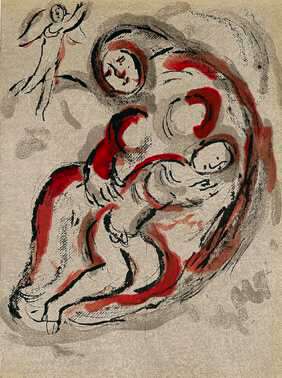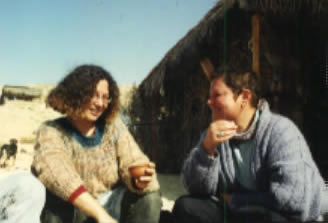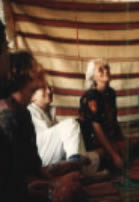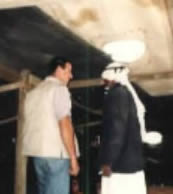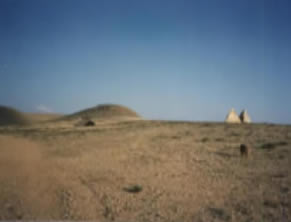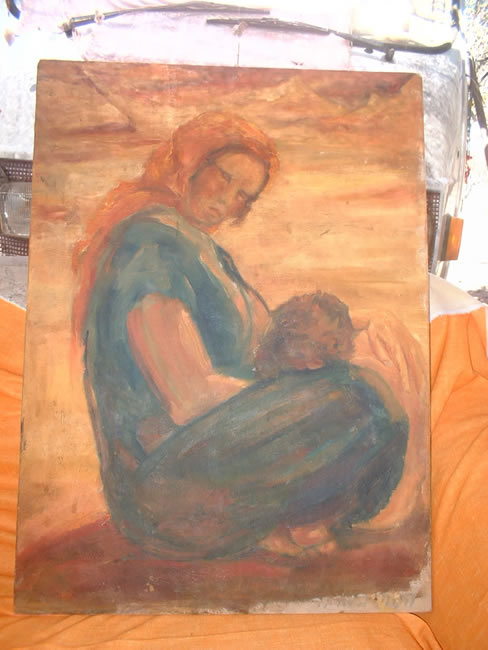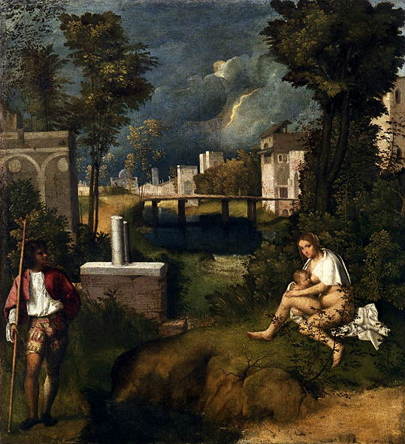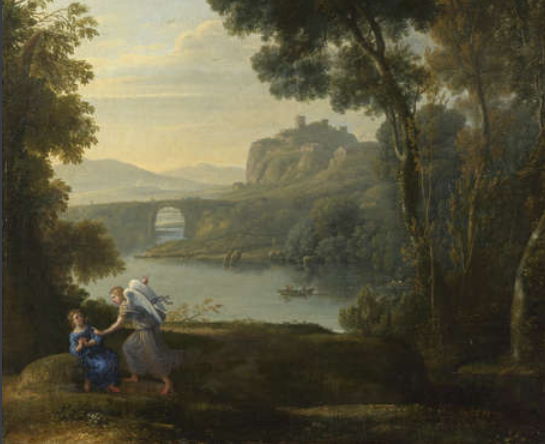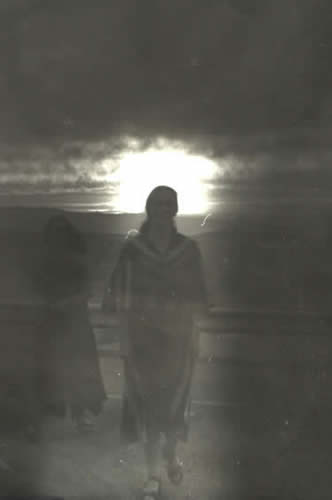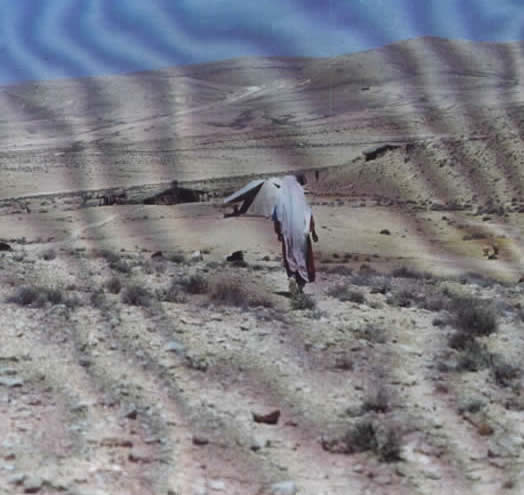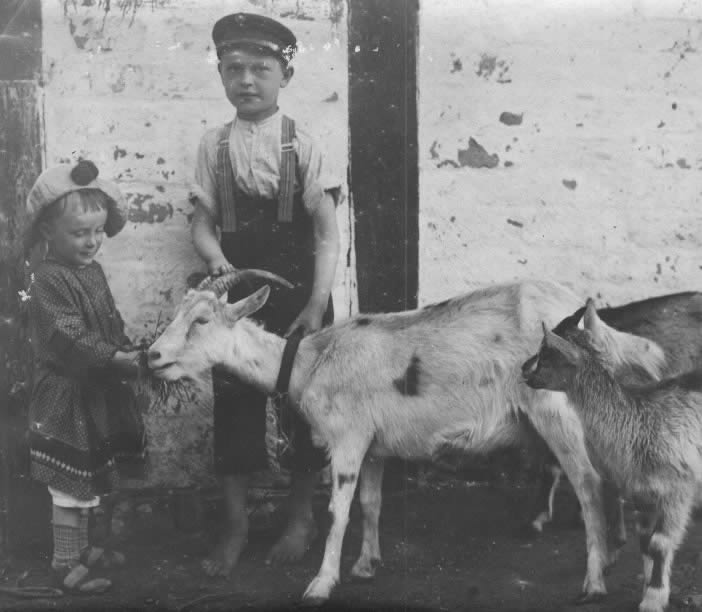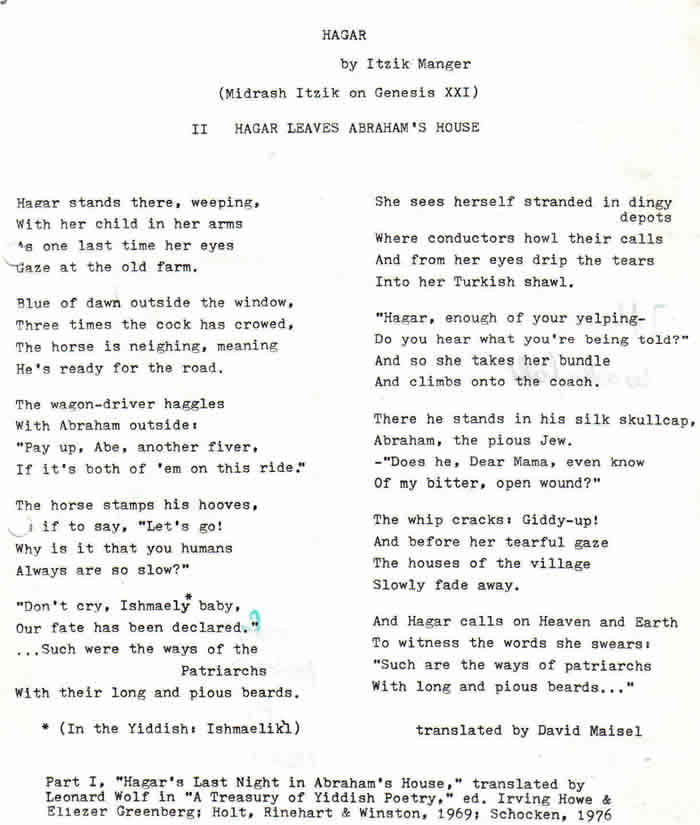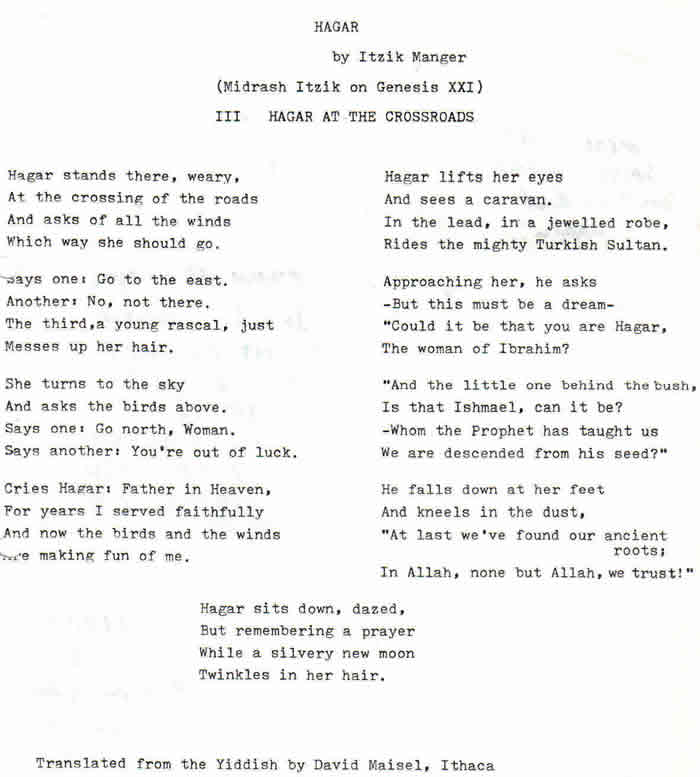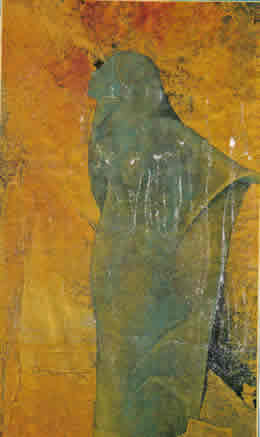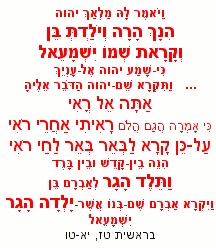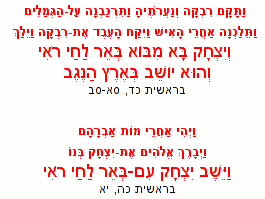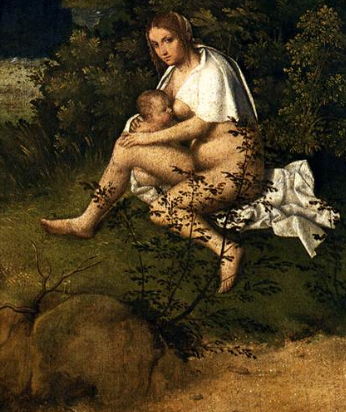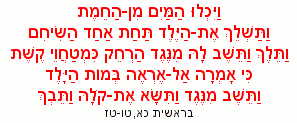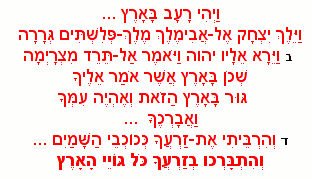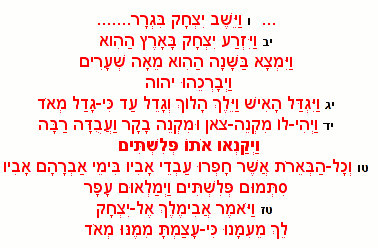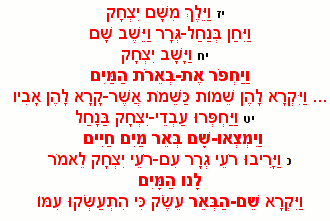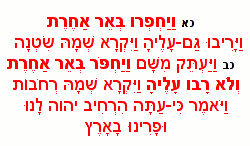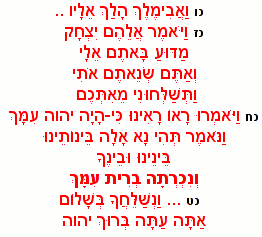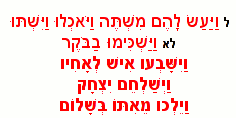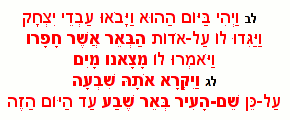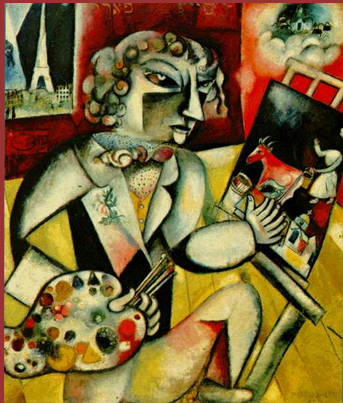|
Genesis
16: 1- 17:
(According to Fox'
translation
which follows the rules of Buber-Rosenzweig
"Now Sarai, Avram's
wife, had not borne him (children).
She had an Egyptian maid - her name was Hagar.
Sarai said to Avram:
Now here, YHWH has obstructed me from bearing;
pray come in to my maid,
perhaps I may be built-up-with-sons through her!
Avram hearkened to Sarai's voice:
Sarai, Avram's wife, took Hagar the Egyptian-woman,
her maid,
at the end of ten years of Avram's being settled in the land of
Canaan,
and gave her to her husband Avram as a wife for him.
He came in to Hagar, and
she became pregnant.
But when she saw that she was pregnant,
her mistress became of light-worth in her eyes.
Sarai said to Avram:
The wrong done to me is upon you!
I myself gave my maid into your bosom,
but now that she sees that she is pregnant,
I have become of light-worth in her eyes.
May YHWH see-justice-done between me and you!
Avram said to Sarai:
Here, your maid is in your hand,
deal with her however seems good in your eyes.
Sarai afflicted her, so that she had to flee from her.
But YHWH's messenger found
her by a spring of water in the wilderness,
by the spring on the way to Shur.
He said:
Hagar, Sarai's maid, whence do you come, whither are you going?
She said:
I am fleeing from Sarai my mistress.
YHWH's messenger said to her:;
Return to your mistress and let yourself be afflicted under her
hand!
And YHWH's messenger said to her;
I will make your seed many, yes, many, it will be too many to
count!
And YHWH's messenger said to her:
Here, you are pregnant,
you will bear a son;
call his name: Yishmael/God Hearkens,
for God has hearkened to your being afflicted.
He shall be a a wild-ass of a man,
his hand against all, hand of all against him,
yet in the presence of all his brothers shall he dwell.
Now she called the name of YHWH, the one who was speaking to her:
You God of Seeing!
for she said:
Have I actually gone on seeing here
after his seeing me?
Therefore the well was called:
Well of the Living-One Who-Sees-Me.
Here, it is between Kadesh and Bered.
Hagar bore Avram a son,
and Avram called the name of the son whom Hagar bore: Yishmael.
Avram was eighty years and six years old when Hagar bore Yishmael
to Avram.
Genesis 17: 1; 15-26
Now when Avram was ninety years and nine
years old
YHWH was seen by Avram
[his name is transformed into Avraham
and he is told about circumcision
as a sign of the covenant and then:]
God said to Avraham:
As for Sarai your wife - you shall not call her name Sarai,
for Sara/Princess is her name!
I will bless her, and I will give you a son from her,
I will bless her
so that she becomes nations,
kings of peoples shall come from her!
But Avraham fell on his face and laughed,
he said in his heart:
To a hundred-year-old man shall there be (children)
born?
Or shall ninety-year-old Sara give birth?
Avraham said to God:
If only Yishmael might live in your presence.
God said:
Nevertheless,
S ara your wife is to bear you a son,
you shall calll his name; Yitzhak/He Laughs.
I will establish my covenant for the ages, for his seed after
him.
And as for Yishmael, I hearken to you:
Here, I will make him blessed, I will make him bear fruit,
I will make him many, exceedingly, exceedingly
---
he will beget twelve (tribal) leaders,
and I will make a great nation of him.
But my covenant I will establish with Yitzhak, whom Sara will
bear to you at this set-time, another
year hence.
When he had finished speaking with Avraham,
God went up, from beside Avraham.
Avraham took Yishmael
his son ....
and circumcised the flesh of their foreskins on that same day,
as God had spoken to him.
Avraham was ninety-nine years old when he had the flesh of his
foreskin circumcised,
and Yishmael his son was thirteen years old when he had the flesh
of his foreskin circumcised.
On that same day
were circumcised Avraham and Yishmael his son...
Genesis 21:2-21
Sara became pregnant and
bore Avraham a son in his old age,
at the set-time of which God had spoken to him.
And Avraham called the name of his son, who was born to him,
whom Sara bore to him:
Yitzhak/He Laughs.
And Avraham circumcised Yitzhak his son at eight days old,
as God had commanded him.
Avraham was a hundred years old when Yitzhak his son was born
to him.
Now Sara said:
God has made laughter for me,
all who hear of it will laugh for me.
And she said:
Who would have declared to Avraham:
Sara will nurse sons?
Well, I have borne him a son in his old age!
The child grew and was weaned,
and Avraham made a great drinking-feast on the day that Yitzhak
was weaned.
Once Sara saw the son
of Hagar the Egyptian-woman, whom she had borne
to Avraham, laughing.
She said to Avraham:
drive out this slave-woman and her son,
for the son of this slave-woman shall not share-inheritance with
my son, with Yitzhak!
The matter was exceedingly bad in Avraham's eyes because of his
son.
But God said to Avraham:
Do not let it be bad in your eyes concerning the lad and concerning
your slave-woman;
in all that Sara says to you, hearken to her voice,
for it is through Yitzhak that seed will be called by your (name).
But also the son of the slave-woman --- a nation will I make of
him,
for he too is your seed.
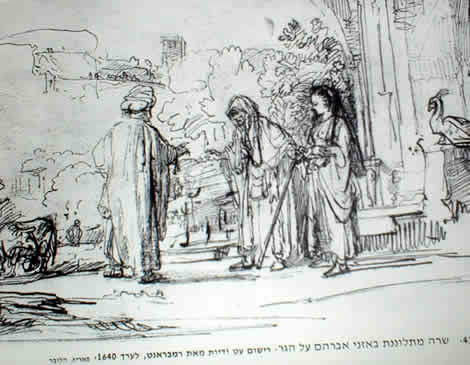
Avraham started-early
in the morning,
he took some bread and a skin of water
and gave them to Hagar - placing them upon her shoulder -
together with the child and sent her away.
She went off and roamed in the wilderness of Be'er-sheva.
And when the water in the skin was at an end, she cast the child
under one of the bushes,
and went and sat by herself, at-a-distance, as far away as a bowhot,
for she said to herself:
Let me not see the child die!
So she sat at-a-distance, and lifted up her voice and wept.
But God heard the voice of the lad,
God's messenger called to Hagar from heaven and said to her:
What is (the matter) with you, Hagar? Do not be afraid,
for God has heard the voice of the lad there where he is.
Arise, lift up the lad and grasp him with your hand,
for a great nation will I make of him!
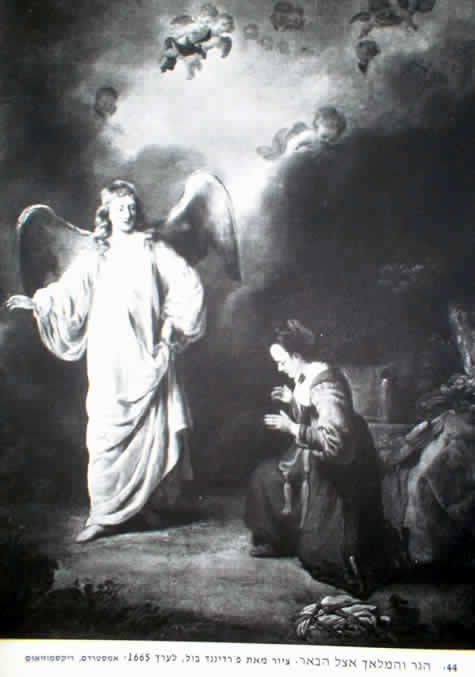
God opened her eyes, and
she saw a well of water;
she went, filled the skin with water, and gave the lad to drink.
And God was with the lad as he grew up,
he settled in the wilderness, and became an archer, a bowman.
He settled in the wilderness of Paran, and his mother took him
a wife from the land of Egypt.
|
Im
Anfang 16: 1- 17
According to "Die Verdeutschung
der Schrift" by Martin Buber ,
together with Franz
Rosenzweig.
Sarai, Abrams Weib, hatte ihm nicht geboren.
Sie hatte aber eine aegyptische Magd, ihr Name war Hagar.
Sarai sprach zu Abram:
Da ER mich doch versperrt fuers Gebaeren,
geh doch ein zu meiner Magd,
vielleicht, dass ich aus ihr bekindet werde.
Abram hoerte auf die Stimme Sarais.
Sarai, Abrams Weib, nahm Hagar die Aegypterin, ihre Magd, nach
Ablauf von zehn Jahren, die Abram im Lande Kanaan
siedelte,
und gab sie Abram, ihrem Mann, ihm zum Weib.
Er ging ein zu Hagar, und sie wurde schwanger.
Als sie aber sah, dass sie schwanger war, wurde ihre Herrin gering
in ihren Augen.
Sarai sprach zu Abram:
Ueber dich meine Unbill!
Selber gab ich meine Magd in deinen Schoss,
nun sie sieht, dass sie schwanger ist, bin ich in ihren Augen
gering geworden.
Richte ER zwischen mir und dir!

Rembrandt: Sarah complains
about Hagar
Abram sprach zu Sarai:
Da, deine Magd ist in deiner Hand, tu mit ihr was deinen Augen
gutduenkt.
Sarai drueckte sie. Sie aber entfloh ihr.
SEIN Bote fand sie am Wasserquell in der
Wueste, am Quell auf dem Wege nach
Schur.
Er sprach:
Hagar, Sarais Magd, woher bist du gekommen, wo ziehst du hin?
Sie sprach:
Vor meiner Herrin Sarai bin ich fluechtig.
SEIN Bote sprach zu ihr:
Kehre zu deiner Herrin und druecke dich unter ihre Haende!
SEIN Bote sprach zu ihr:
Mehren will ich, mehren deinen Samen, er werde nicht gezaehlt
vor Menge.
SEIN Bote sprach zu ihr:
Da, schwanger bist du,
gebaeren wirst du einen Sohn,
seinen Namen rufe:
Jischmael, Gott erhoert,
denn erhoert hat ER deinen Druck.
Ein Wildeselmensch wird
der,
seine Hand wider alle, aller Hand wider ihn,
all seinen Bruedern ins Gesicht macht er Wohnung.
Sie aber rief SEINEN Namen, des zu ihr Redenden:
Du Gott der Sicht!
Denn sie sprach:
Sah auch wirklich ich hier
dem Michsehenden nach?
darum rief man den Brunnen
Brunn des Lebenden Michsehenden.
Da ist er, zwischen Kadesh und Bared.
Hagar gebar dem Abram
einen Sohn.
Abram rief den Namen seines Sohns, den Hagar gebar:
Jischmael.
Abram war sechsundachtzig Jahre, als Hagar Abram den Yischmael
gebar.
Im Anfang 17: 1; 15-26
Als aber Abram neunundneunzig
Jahre war,
Liess ER von Abram sich sehen
[sein Name wird umgewandelt in "Abraham" und ihm wird
mitgeteilt,
dass die Beschneidung ein Zeichen des Bundes sein wird. Darauf:]
Gott sprach zu Abraham:
Sarai, den Weib, ihren Namen sollst du nicht mehr Sarai rufen,
denn Sara, Gebieterin, ist ihr Name.
Segnen will ich sie und will dir auch aus ihr einen Sohn geben,
segnen will ich sie, dass sie zu Staemmen werde,
Koenige von Voelkern sollen werden aus ihr.
Abraham fiel auf sein Antlitz und lachte,
er sprach in seinem Herzen;
Einem Hundertjaehrigen soll geboren werden? und Sara soll als
Neunzigjaehrige gebaeren?
Abraham sprach zu Gott:
Wenn nur Jischmael lebt vor dir!

Gott sprach:
Dennoch,
Sara, dein Weib gebiert dir einen Sohn,
seinen Namen sollst du rufen; Jizchak, Er lacht.
Mit ihm will ich meinen Bund errichten zum Weltzeit-Bund fuer
seinen Samen nach ihm.
Doch auch fuer Jischmael erhoere ich dich;
da, ich habe ihn gesegnet, ich lasse ihn fruchttragen, lasse ihn
sich mehren reich, ueberreich,
zwoelf Fuersten wird er erzeugen, ich will ihm geben zu einem
grossen Stamme zu werden.
Meinen Bund aber werde ich mit Jizchak errichten, den Sara dir
gebiert zu dieser Frist im andern Jahr.
Er hatte vollendet mit ihm zu reden,
und Gott stieg auf, hinauf von Abraham.
Abraham nahm Jischmael seinen Sohn....
und beschnitt das Fleisch ihrer Vorhaut an ebendem Tag,
wie Gott mit ihm geredet hatte.
Neunundneunzig Jahre war Abraham, als das Fleisch seiner Vorhaut
beschnitten wurde,
und dreizehn Jahre war Jischmael, sein Sohn, als das Fleisch seiner
Vorhaut beschnitten wurde.
An ebendem Tag wurde Abraham und Jischmael, sein Sohn, beschnitten...
Im Anfang 21:2-21
Sara wurde schwanger und
gebar Abraham auf sein Alter einen Sohn,
zu der Frist, von der Gott ihm geredet hatte:
Und Abraham rief den Namen seines Sohnes, der ihm geboren worden
war, den Sara ihm geboren hatte;
Jizchak, Er lacht.
Abraham beschnitt Jitzchak seinen Sohn zu acht Tagen, wie Gott
ihm geboten hatte.
Abraham aber war hundert Jahre, als Jizchak sein Sohn ihm geboren
wurde.
Sara sprach:
Ein Lachen hat Gott mir gemacht,
alljeder ders hoert lacht ueber mich.
Und wieder sprach sie:
Wer haette Abraham zugeraunt:
Soehnlein wird Sara saeugen?!
Wohl, einen Sohn habe ich ihm auf sein Alter geboren!
Das Kind wuchs gross und wurde entwoehnt,
und Abraham machte ein grosses Trinkmahl, am Tag da Jizchak entwoehnt
wurde.
Einst sah Sara den Sohn
Hagars der Aegypterin, den sie Abraham geboren hatte,
spottlachen.
Sie sprach zu Abraham:
Vertreibe diese Sklavin und ihren Sohn,
denn nicht soll der Sohn dieser Sklavin mit meinem Sohn, mit Jizchak,
erben.
Sehr arg war die Rede in den Augen Abrahams wegen seines Sohns.
Aber Gott sprach zu Abraham:
Nicht sei es arg in deinen Augen um den Knaben und um deine Sklavin,
in allem, was Sara zu dir spricht, hoere auf ihre Stimme,
denn in Jizchak wird dir Same berufen.
Aber auch den Sohn der Sklavin, zum Stamm will ich ihn machen
denn dein Same ist er.
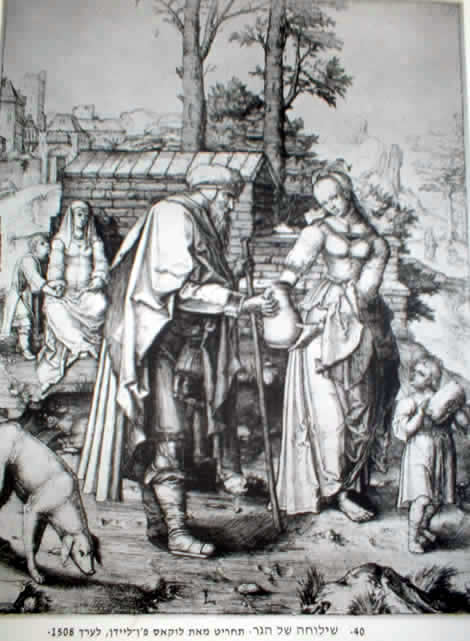
Abraham stand fruehmorgens
auf, nahm ein Brot und einen Schlauch Wassers
und gab es Hagar - legte es auf ihre Schulter - samt dem Kind
und schickte sie fort.
Sie ging und verirrte sich in der Wueste Ber-scheba.
als nun das Wasser im Schlauch zuende war, warf sie das Kind unter
einen der Straeucher
und ging und sass fuer sich, gegenueber, wie Bogenzieler entfernt,
denn sie sprach:
Ich kann nimmer zusehn, wie das Kind stirbt.
so sass sie gegenueber, erhob ihre Stimme und weinte.
Gott aber hoerte die Stimme des Knaben,
Gottes Bote rief Hagar vom Himmel her zu und sprach zu ihr:
Was ist dir, Hagar! Fuerchte dich nimmer,
denn gehoert hat Gott auf die Stimme des Knaben ebendort wo er
ist, -
auf, hebe den Knaben und umfasse ihn mit deiner Hand, denn zum
grossen Stamm will ich ihn machen.
Gott klaerte ihre Augen,
und sie sah einen Wasserbrunnen.
Sie ging hin, fuellte den Schlauch mit Wasser und letzte den Knaben.
Und Gott war bei dem Knaben.
Er wuchs gross und sass in der Wueste, und er wurde ein Schuetz,
ein Bogenfuehrer.
Er sass in der Wueste Paran, und seine Mutter nahm ihm ein Weib
aus dem Land Aegypten.
|
